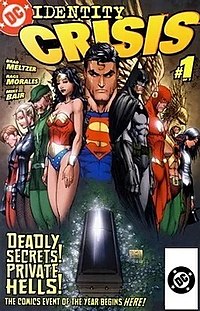The exploration of death is inevitable in a superhero story.
Not to be confused with the loss that often makes the hero, this exploration of death is of the loss which occurs during and perhaps because of being a superhero. Batman has already lost a Robin. In Marvel, Spider-man has lost a girlfriend.
A hero is supposed to save lives so what questions and doubts does death raise?
Identity Crisis ups the ante by making the death a public affair. Sue Dibny, wife of Ralph also known as the Elongated Man, is murdered; and the rest of the Justice League, all the heroes of DC, along with their families are watching.
Who would dare strike at a superhero’s home and make a very personal kill knowing that every other superhero in the world will be watching?
In terms of drama, the choice of a character with elastic powers was a smart move. Ralph is barely keeping himself rigid; grief has made him misshapen almost as if his soul is being torn apart. He's a geek, not the handsome godly figure that most heroes can be, an every man which makes Sue so special.
The Justice League were watching it all as Ralph was literally out of shape trying to give a eulogy was icing on the cake.
The Justice League were watching it all as Ralph was literally out of shape trying to give a eulogy was icing on the cake.
Death is almost as bad as time travelling. The mind can only back and see the questions, the mistakes, the doubts. Could life have been happier if not for the calling?
On a team level the Justice League showed cracks. The grieving husband has supporters equally out for blood as he is and there are still those who still favor doing the “right thing”. And that’s just the ethical divide. There is also the hierarchical divide making the arguments.
Superman the god on earth, Boy Scout, humble and straight shooter to boot; he’s calling the shots. Batman who seems to act like the bulldog ironically is still in step with the Man of Steel. Green Arrow leads the other side with the cause célèbre Elongated Man and Sue’s murder in tow.
It was Green Arrow who kept referring to Superman as the top. Green Arrow who waited for his turn at the crime scene and thereafter found a personal note from Batman at the site asking – or ordering – that nothing be touched. The way talks feels as if there's resentment when a hero should otherwise have none of it.
Not that I can blame him, the entire team is grieving and Batman goes solo on a crime scene. A committee could have been more collegial.
Not that I can blame him, the entire team is grieving and Batman goes solo on a crime scene. A committee could have been more collegial.
But it’s not a personal and petty disagreement between Bruce and Ollie cause the latter had a team with him when he had his turn of the crime scene. Can you imagine there's a group willing to look over what Batman may have missed.
Finally, the genius of the story is that there is always a family member of a superhero in the backdrop. Superman had his mother around as well as Lois. Ollie has a son who has taken up the green tights as well (I don’t follow DC much)? Even Batman visiting his parent’s tombs felt like a search for a hand to hold.
Family members made the story more human than the average pissing contest between costumed figures. Family makes the heroes and even villains vulnerable. Then again families also make everything worth enduring.


No comments:
Post a Comment